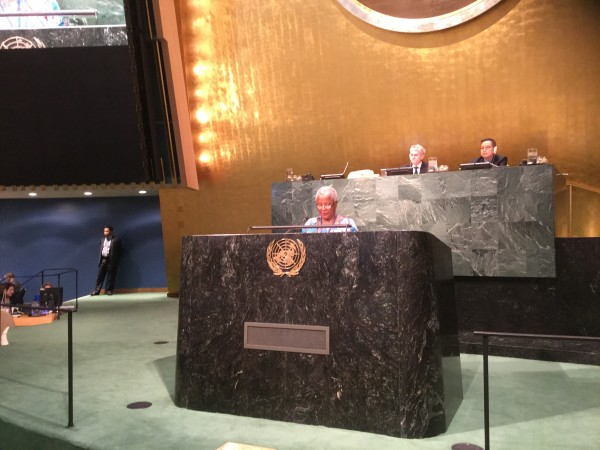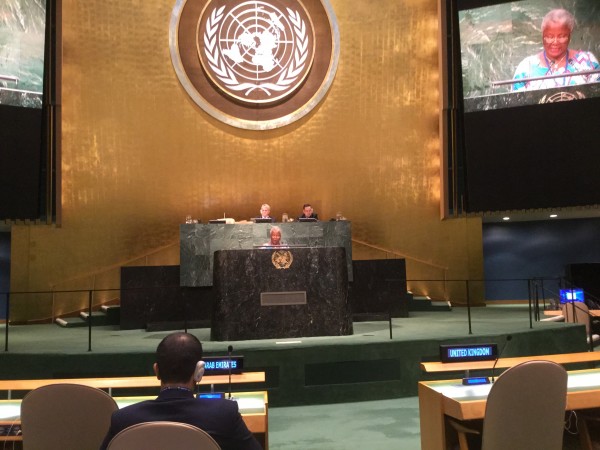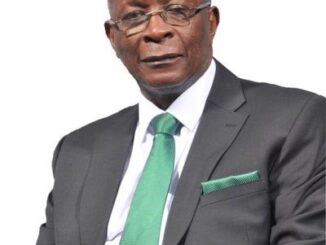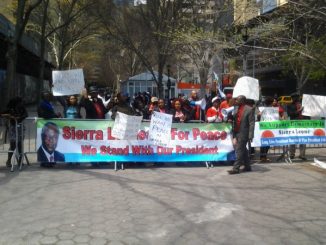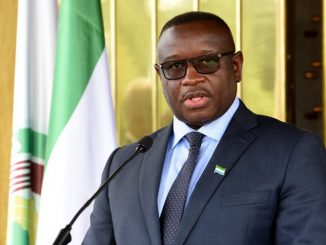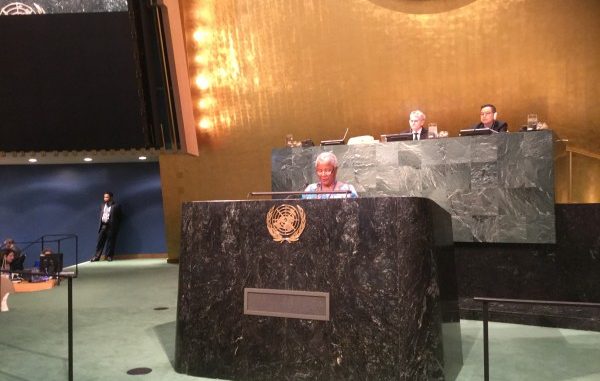
STATEMENT ON BEHALF OF THE AFRICAN GROUP BY SIERRA LEONE, ON AGENDA ITEMS: NEW PARTNERSHIP FOR AFRICA’S DEVELOPMENT: PROGRESS IN IMPLEMENTATION AND INTERNATIONAL SUPPORT: CAUSES OF CONFLICT AND THE PROMOTION OF DURABLE PEACE AND SUSTAINABLE DEVELOPMENT IN AFRICA, AND 2001-2010: DECADE TO ROLL BACK MALARIA IN DEVELOPING COUNTRIES PARTICULARY IN AFRICA, AT THE PLENARY OF THE 70TH SESSION OF THE GENERAL ASSEMBLY
Mr. President,
It is my singular honour and pleasure to deliver this statement on behalf of the African Group. I would like to align myself to the statement made by the distinguished representative of South Africa on behalf of the G77 and China. This debate marks the successful culmination of the Africa Week 2015, which has truly raised NEPAD’s profile here at the United Nations at a very critical juncture, when Member States are preparing to implement the 2030 Agenda. The African Group would like to thank the Secretary-General for the effort he has put in compiling his reports on the items under discussion today, and for his continued leadership and commitment in placing Africa’s agenda at the heart of the United Nations system.
Mr. President,
This year 2015 is truly special for the world in general and Africa in particular in terms of its relevance to the agenda of NEPAD. The United Nations celebrated its seventieth anniversary, the post 2015 development agenda has been recently adopted, the Addis Ababa Action Agenda was also adopted as the way forward in Financing for Development, and there are high hopes for a far reaching agreement on Climate Change in Paris in December.
In addition 2015 is also a pivotal year for Africa’s development, with the adoption of the African Union Agenda 2063, the long term vision for the continent’s transformative development of the next half century, and its first 10 year implementation plan and ultimately their implementation. It is in this regard that the African Group fully endorses and applauds the choice of the theme for the 70th session of the General Assembly.
NEPAD remains committed to facilitating and implementing Africa’s priority programmes, and to consolidate the positive steps already taken towards continental transformation. The African Group notes with great satisfaction that agriculture remains at the centre of Africa’s development agenda. Agriculture forms a significant portion of the economies of all African countries and has the potential of contributing towards major continental priorities, including eradication of poverty and hunger, boosting inter-Africa trade and investments, fostering rapid industrialization and economic diversification, sustainable resource and environmental management, and creating jobs for thousands of youth as well as to improve livelihoods.
During the sixty-eighth session of the General Assembly, we welcomed and celebrated the tenth anniversary of the implementation of the Comprehensive Africa Agriculture Programme (CAADP). Also, in 2014 at the peak of the commemoration of the Africa Year of Agriculture, we celebrated the rekindling of CAADP through the adoption of the Malabo Declaration on Accelerating Agricultural Growth and Transformation for shared Prosperity and Improved Livelihoods,
The main thrust of the Malabo declaration is the undertaking by African Governments to sustain CAADP’s momentum for the next decade, including increasing financial investment in agriculture through domestic resource mobilization and the allocation of 10 per cent of public expenditure to the sector; ending hunger by 2025; halving poverty by the year 2025, through inclusive agricultural growth; ensuring a 6 per cent growth of the sector per annum; boosting intra-Africa trade; enhancing resilience and reducing climate vulnerability; as well as fostering mutual accountability. We therefore wish to underscore the importance of partnerships and international cooperation in attaining CAADP’s objectives.
Mr. President,
Infrastructure development continues to be a key priority for Africa, in which NEPAD is playing a pivotal role through the implementation of the Programme for Infrastructure Development in Africa (PIDA). We duly note the efforts undertaken since October 2013, including efforts to secure funds to implement 16 infrastructure pilot projects, identified as quick wins for financing and implementation. We welcome the Dakar Summit, held in June 2014, which adopted the Dakar Agenda for Action, for financing the said pilot infrastructure projects. We note the major huddles in financing the implementation of PIDA projects. We therefore call for the mobilization of resources from all sources, both public and private.
Over a decade ago, the African Heads of State and Government established the African Peer Review Mechanism (APRM), NEPAD’s flagship governance programme, which aims at promoting good governance across the continent. Through this scheme, African countries have resolved to adopt additional measures to fight corruption, promote good governance, transparency and accountability, especially in the field of natural resources. We note with appreciation that 18 member states have been reviewed and would encourage the Agency to seek ways of having more countries graduate as in the case of Chad and Senegal.
Mr. President
The African Group thanks the Secretary-General for his report entitled “Causes of conflict and the promotion of durable peace and sustainable development in Africa”. We note the growing linkages between political, social and economic exclusion and violent conflict. As a continent we believe that tackling this trend will require inclusive people centered approaches in the promotion of peace, security and socio-economic development, as emphasized in the African Union, Agenda 2063 and its first ten year implementation plan. In this regard Africa is committed to addressing the root causes of conflicts and prevent the outbreak of armed conflicts, including through the African Peace and Security Architecture (APSA).
Mr. President,
Malaria remains a serious health concern for Africa. It is undoubtedly among the issues that shall require continued attention even beyond the implementation of the SDGs. It is of great concern that this disease, which is entirely preventable and treatable, should continue to kill thousands of people, especially children in the African continent. It is in this regard that we welcome the continued commitment of the intemational community to eradicating malaria and other diseases, as outlined in Goal 3 of the Sustainable Development Goals. We also welcome the declaration of the 2013 special Summit of the African Union on HIV/AIDS, tuberculosis and malaria, which reaffirmed the commitment of African Governments to accelerate the implementation of existing frameworks, including the Abuja Declaration and Plan of Action on Roll Back Malaria in Africa. We note with great concern that funding to fight malaria is far below the resources required to reach universal coverage of interventions. We therefore call upon developed countries and other partners to fulfil all the commitments made towards the eradication of this scourge.
Mr. President,
With the support of the international community, Ebola virus disease in West Africa is now largely under control. At this point, I would like to acknowledge the valuable role of the Secretary General in leading the fight and to thank him for his efforts. However there is the urgent need to help African countries especially those most affected by the virus, improve their health systems and build core capacity to enhance access to water, sanitation and health services in order to avoid a similar situation in the future. The African group considers that the Ebola outbreak is another wakeup call that business as usual should not prevail going forward as we implement the post 2015 development agenda. The needs of the most vulnerable must get due attention and adequate means of implementation must be provided in the post-2015 development agenda in a manner that is commensurate with the huge challenges.
Mr. President,
Let me conclude by underscoring further, the importance of fulfilment of commitments made to Africa, including those relating to Official Development Assistance (ODA). ODA providers reaffirmed commitments to achieving the target of 0.7 percent of gross national income as ODA and the target of 0.15 to 0.20 percent of GNI as ODA for least developed countries in Addis Ababa in July this year. We therefore call on development partners to fulfil their promises and commitments in the spirit of the Monterrey Consensus, the G8 Gleneagles Summit and the Addis Ababa Action Agenda. This will go a long way not only in terms of restoring trust and building confidence but also fostering mutual respect in global partnerships.
I thank you.

